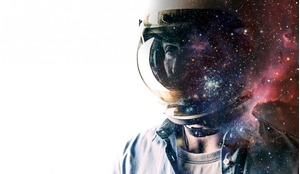Between 1997 and 2010, I was a Member of Parliament in the United Kingdom. That system has been around for many centuries and a lot has changed in that time. For example, in the early 20th century, Britain’s political system took the rather ‘radical’ step of giving women the vote. Who would have thought it? ‘What a risk’, they thought. Later in the 20th century - and again in the 21st - the UK elected female Prime Ministers. As a sign of the times, the second was criticised for her alleged lack of leadership but never for her gender.
The Congress painted a multi-strand strategy for everything from the science agenda to the way that Asgardia will recognise its citizens
So evolution is possible, even in established democracies. However, old-established loyalties and power structures mean Earth nations still often disappear down a ‘rabbit hole’ of vested interests, to focus on things that distract from the collective good of a population.
Asgardia is trying to do it differently. Dr Igor Ashurbeyli - Asgardia’s first Head of Nation - is someone who believes collective actions speak louder than self-serving words. Looking back on the occasion of the first anniversary of Asgardia’s parliament, it seems to me his philosophy is working.
There was an opportunity to measure Asgardia’s progress at a unique event in Vienna in April 2019. Key representatives of Asgardia’s government and parliament met to align their programmes of action - and to check if the various areas of work were consistent with the goal of permanent space habitation by 2043.
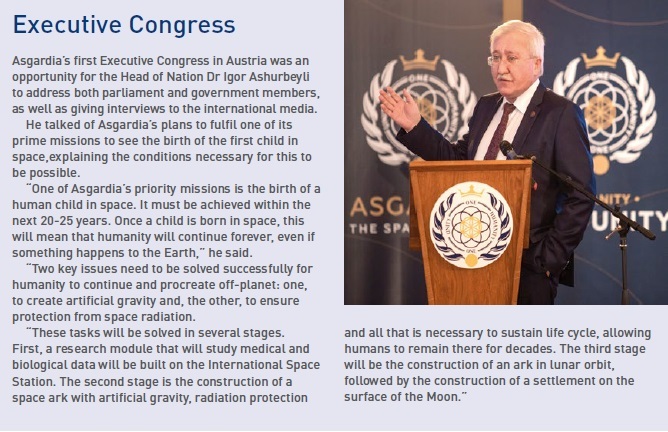
Political system
In Asgardia’s political system, there are 12 key areas of activity - which you can think of as Departments or Ministries. These cover things such as Science, Citizenship and Trade & Commerce. Each has a Chair of Committee in Parliament and a Cabinet Minister in Government. Asgardia also has a Head of Nation - which is an executive role, not simply an honorary title. Government is led by the Prime Minister, Ana Mercedes Diaz. Parliament is the responsibility of myself, the Chair of Parliament. We also have a Supreme Justice to oversee the legal system, headed up by Yun Zhao.
The Asgardia Executive Congress in Vienna was the first time that all 12 areas, and the heads of each element of the political and legal systems, presented their work plans to each other for the short, medium and long term.
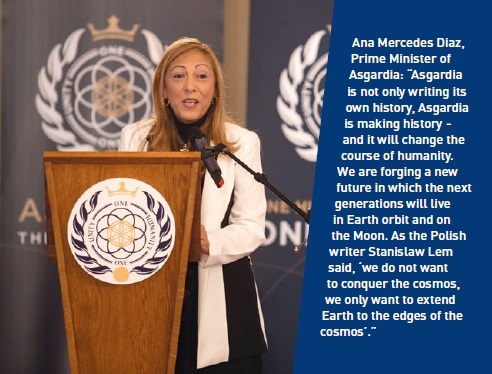
How did it go? It went well. Delegates presented, talked, socialised and thought about real problems - and plausible solutions. There was a social element to it too but fundamentally what bonded everyone was the surprisingly consistent collective commitment to facilitating communities in space. The Congress painted a multi-strand strategy for everything from the science agenda to the way that Asgardia will recognise its citizens.
This wasn’t all easy. Preparing the strategies and presentations required enormous investment of time and intellectual effort and I see why nobody has set up a nation in such a way before. The amount of thinking, preparation and debate required to achieve the sort of stable operational structures at the centre of Asgardia’s democracy has been phenomenal.
Collective interest
Collective actions speak louder than self-serving words
Also, the driving force is different than in most other political evolutions - or revolutions. Often, the motive of those leading the creation - or overthrow - of a political system has been a combination of perceived crisis and at least a degree of self-interest. However, Asgardia wasn’t born out of crisis or opportunism and, instead of self-interest, it is underpinned by a sense of collective interest. This required us to find new ways to think about how best to keep the focus on the nation by default, in a way which can’t be overruled by more self-serving considerations.
Were there problems? Yes. If I were to say otherwise, this article would be propaganda rather than an honest account! The three chief challenges for Asgardia so far have been: 1) technical matters related to the digital process of running Parliamentary sessions; 2) clarity on how best to integrate our interrelations with Earth-based nations; and 3) the colossal scientific milestones which must be achieved for humanity to live in space without open-ended dependence on Earth for biological, social or psychological support.
Cynics say these are insuperable challenges. But in doing so, they resign the human race to eternally living on our home planet, right up to the time when Earth is finally barbequed by the Sun.
By contrast, one year on, Asgardia does not regard Christopher Columbus, the Wright Brothers, Yuri Gagarin or Neil Armstrong as actors in an odyssey which ended around 1972. We think that the narrative in which they starred must go on to the stars. This sense of purpose was palpable at the Congress and the accompanying Digital Sitting of Parliament which took place in parallel - another technically impressive feat for this fledgling nation.
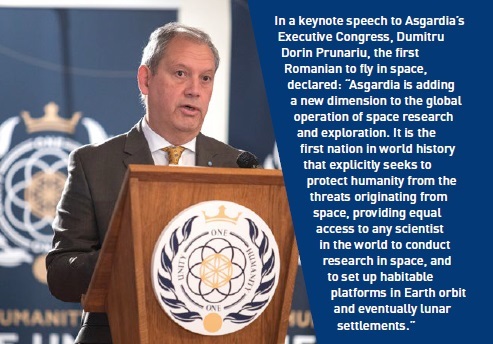
Alternative solutions
While Asgardia is entirely supportive of the great works achieved in low Earth orbit (LEO) by Europe, Russia, America and China, the last 12 months have also helped us promote the tenet that space doesn’t belong to any one terrestrial nation.
Turf wars on Earth have done incalculable damage and served to subjugate entire continents. In a space war there will be no winners. Everybody dies. Asgardia understands that. Military intervention can never be on the agenda. We have to solve our problems in other ways.
Asgardia is adding a new dimension to the global operation of space research and exploration
With over seven billion humans to choose from, and only 150 million spaces for full citizenship of Asgardia, we aren’t desperate to convince those who are sceptical about our mission - or don’t want to play a part. They can stay on Earth, and that’s fine - as long as they don’t wreck the planet or wipe out the human race in some act of unforgivable belligerent neglect.
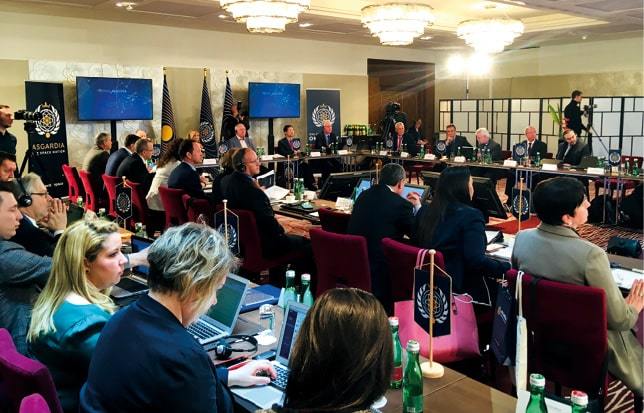 First Executive Congress in April 2019.
First Executive Congress in April 2019.
By contrast, for Asgardians, Earth is great - but not the end point. We’re working out the details politically so that when the time comes, we can pursue democracy without any discontinuity. We already have weekly political summits between government ministers and parliamentary committee members who are over 30 times further apart than the distance from Earth’s surface to LEO. Just a year into our nation building, our current virtual platform is capable of providing real-time democratic debating and voting functions at locations that could include space stations as far out as the Moon.
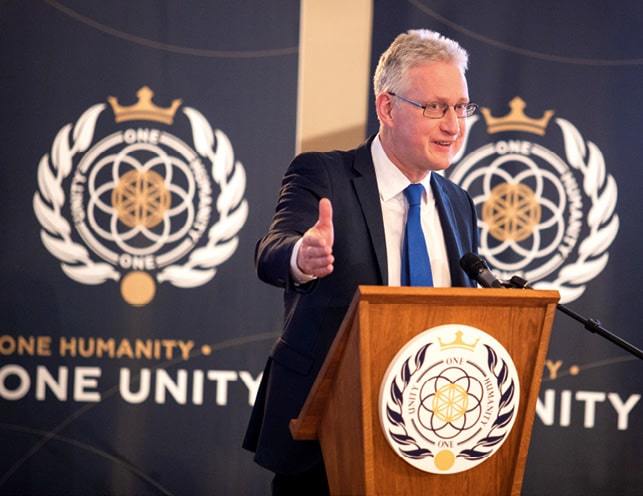 Lembit Öpik reflects on the first year of Asgardia’s parliament and government.
Lembit Öpik reflects on the first year of Asgardia’s parliament and government.
Stairways to heaven
The level of success achieved by our digital political arrangements can be gauged by the interactions at the Congress. Those present had generally only physically met just once before - or even not at all. Yet delegates greeted each other as true friends.
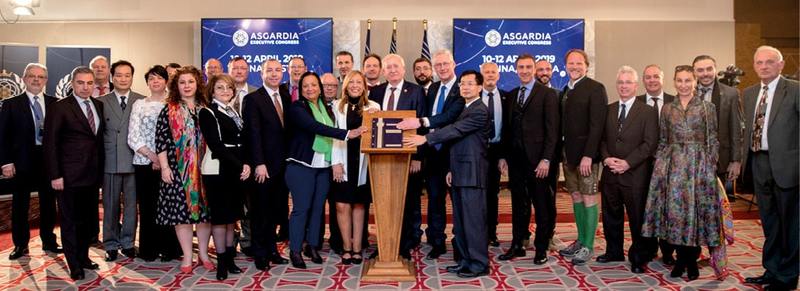 Asgardia’s government members.
Asgardia’s government members.
There was no ‘getting to know you’ period. Chairs of Committees and Ministers quite simply ‘knew’ each other - even though almost all of their interaction up to that point had been through remote telecommunications. I concluded that it is possible to identify with a nation, and to build an authentic political community, through intelligent virtual systems. That’s vital for space-based nation building.
The Sun always shines upon those willing to aim high enough to see above our terrestrial horizon
The virtual aspect of our democracy is one illustration of why these last 12 months have been so progressive. Almost everything we’ve done has been done for the first time’ Using current technology, we’ve managed to make it work.
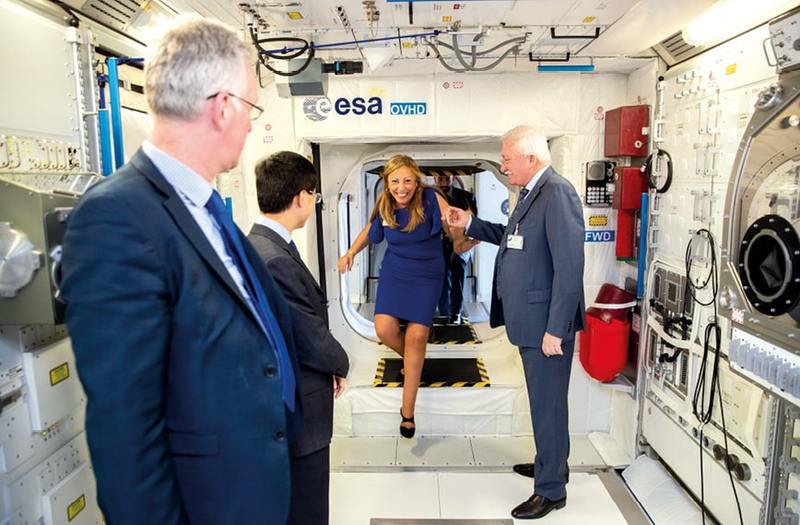 Dr Igor Ashurbeyly with Prime Minister Ana Mercedes Diaz, Yun Zhao (Supreme Justice) and Lembit Öpik viewing a Space Station module mock-up at the European Astronaut Centre in Germany.
Dr Igor Ashurbeyly with Prime Minister Ana Mercedes Diaz, Yun Zhao (Supreme Justice) and Lembit Öpik viewing a Space Station module mock-up at the European Astronaut Centre in Germany.
The stairway to the heavens will take time to build. But the first steps are in place now, and if you’re willing to play your part, regardless of who you are and where you live, as far as Asgardia is concerned, you’re in.
Dr Ashurbeyli has opened the door to a credible space habitation agenda. The first anniversary of the formation and functioning of Asgardia’s Parliament is testimony to the fact that where there’s a human will, there’s a stellar way. And sure as night follows day on Earth, the Sun always shines upon those willing to aim high enough to see above our terrestrial horizon.
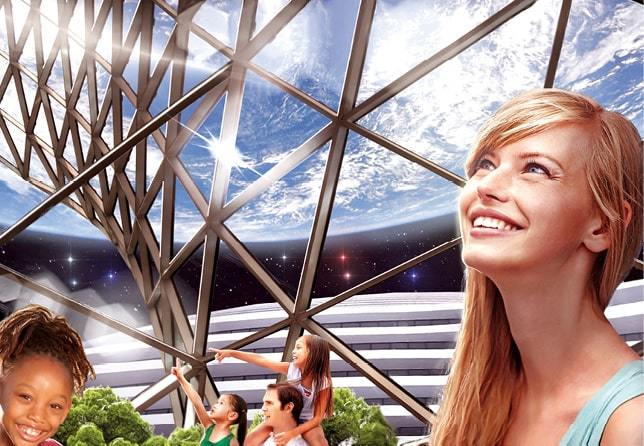 Life on a future Earth-orbiting space ark.
Life on a future Earth-orbiting space ark.










